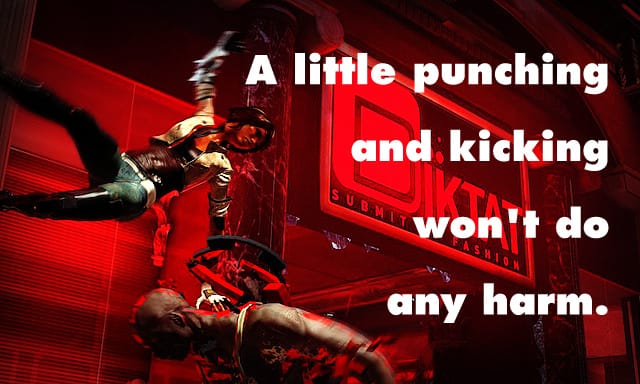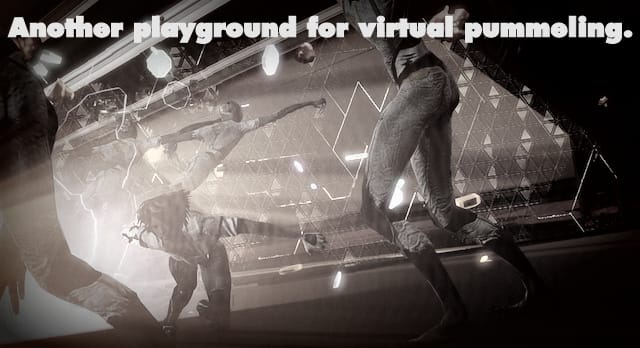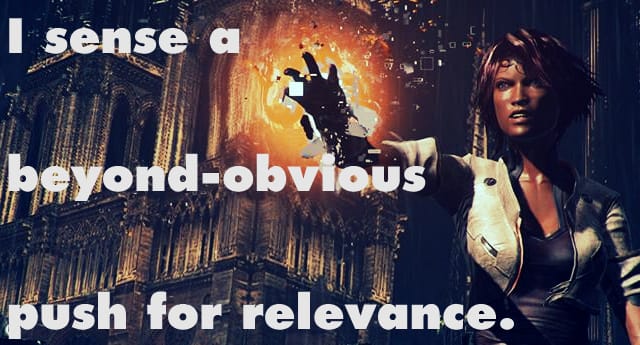Expectations are a kind of memory-warrior, sent from the future to ruin our naive, pure experience with the world. I’d hunt them down if I could. It’s unfair, really, how first impressions coat what comes next, even if the entirety should absolve the slice. But it can’t. The psychic wound never fully heals.
Let’s back up. Public relations representatives send a guide along with their client’s game in order to help the reviewer through the experience. It’s like an instruction manual (kids, ask your parents) but with a focused audience: those critiquing your game in advance of the consumer. As documents go, they’re fairly mundane, and the more I ponder the existence of them at all, the more I question their presence in the first place, and I understand how games are often seen as utilitarian amusements and not as art, because Roger Ebert (rest his soul) was never given a guide to watch Kundun; he just suffered through it like the rest of us.
If only I could have forgotten.
I mention this only because there is a graceless agony to Remember Me’s review guide, and it flavored my entire experience with the game. Which is unfortunate, because the concept at the title’s core is worth exploring, and ultimately worth the drudgery of hitting mutants in the jaw hundreds of times. If only I could have forgotten.
Neo-Paris, 2084. Cue the latest dystopia. Only this time, robots are slaves and memories have become sharable data, like attached JPEGS on emails. Unpleasantries can be deleted. Happiness is a download away. Memories become the new drugs. You play as Nilin, a mercenary skilled in remixing others’ memories, and so you are the enemy to a state that likes control. Your own memory has been wiped. There’s a detailed plot here but as far as I can tell, Remember Me plays out like Total Recall meets Humpty Dumpty: your goal is to put the pieces back together again; succeed and free humanity from its tyrannical mind-controlling overlords.
Remember Me plays out like Total Recall meets Humpty Dumpty: your goal is to put the pieces back together again.
So that guide. (On its cover: ***Please Read Before Playing***.) The guide is eleven pages long. The first page details all embargo information, notes for how much of the game can be spoiled during the review. The next is a chapter-by-chapter outline of the plot. Page three introduces the most interesting aspect of the game, Memory Remixes. These sections play out entirely within the mind of another character; you watch a memory unfold, then have the ability to rewind and change certain elements in order to influence the memory-owner’s understanding of what took place. In the game, they work as interstitial chapters between your standard running, climbing and shooting, moving the story forward but, more importantly, giving you control of this strange new power: to delve into another’s past and alter not the event itself but their perception of it.
This is a slice of interactivity that games can do, could do, so well, if they focused less on what’s placed in their character’s outstretched hands and more on that undulating swampland of the mind. I couldn’t wait to jump in and muck up some histories.

But enough about memory glitches and narrative immersion. The next section of my beloved guide introduces something called “The Combo Lab.” This “allows you to create and customise your own bespoke combos by unlocking new fighting move memories and combining them to maximise their power.” Fair enough. A little punching and kicking won’t do any harm. Then I turned the page.
A game I expected to be about the past and how it shapes us is instead another playground for virtual pummeling.
“Before her memory was erased, Nilin was a very powerful fighter. Progressively, she will have to remember all the moves she once knew…. these fighting moves are called Pressens.” So amnesia becomes less a story conceit and more an easy way to calibrate the player’s sense of growing more powerful as the game goes on. The guide continues. “There are many different ways to combine Pressens in order to create powerful and personalized combos.” Another page.
“In the below combo, only the first three hits are assigned. The unassigned Pressens will not be part of the combo.” Flip to page 6.
“By combining different Pressens types into a single combo you can create multi-usage combos.”
The next five pages go on to explore further the game’s deep system of combos, AKA the order and magnitude in which you punch and/or kick your enemies. Even before I insert the disc, my impression is soured; a game I expected to be about the past and how it shapes us is instead another playground for virtual pummeling.

I was wrong to have this treatise on multi-hit combos spoil my enjoyment of what is a fascinating experiment. But the ratio bore out: If my time with Remember Me could be rendered into 11 pages of Xeroxed paper stapled at the corner, I’d say the breakdown of the guide was pretty spot-on: One paragraph of inventive exploration into new mechanics; 10 ½ pages of boiler-plate action-fantasy. That paragraph, though, is some Borges-level stuff. You want to slog through the tedium of English-as-a-Second-Language grammar exercises in order to turn the page and soak in the splendor.
Remember Me hires a 25-hours-a-week tutor to sit with you, offering up homemade flashcards and texting you reminders during breakfast.
At least the game and guide stem from a consistent insight: those playing do not traffic in subtlety. If we put in combos, by goodness, we will explain there are combos. Even outside the confines of the press-only guide, the game pauses and reminds you of each action to take as they unlock throughout your playthrough. Tutorials are commonplace in today’s market, and often needed; Remember Me hires a 25-hours-a-week tutor to sit with you, offering up homemade flashcards and texting you reminders during breakfast.
Even the basic story, which shoots for a kind of Philip K. Dick Sci-Fi by way of Aldous Huxley cyber-future, unspools in such twisted threads that the main character’s gender and ethnicity become the story’s calling card. I sense a beyond-obvious push for relevance. In the still-present mire of white dude-centric leads, Capcom and developer Dontnod chose a black female lead. Which is awesome, yes, for reasons of inclusion and diversity. But the choice seems moored to false aspiration, a hope to be noticed. And that title, begging, pleading: Remember Me?

And that title, begging, pleading: Remember Me?
The very first event we see happen is something like reverse sexual abuse, filled with the requisite anguished screams. Nilin, the main character, is having her memory removed, in effect being given back her innocence. Environmental details further buff this tone of regret; graffiti spouts such wisdom as L’erreur est humaine and the Franglish-Ebonics I est mal: I is bad.
When I arrived at the first “Memory Remix” section, I wished I could stay there, inside another’s mind, instead of retreating back to the same ol’ rinse-and-repeat blitzkrieg. To dissuade a character from killing you, there’s no dialogue tree or magic potion tucked away in Level 2. Instead, you enter her memory and change her perception of one pivotal event from the past. By playing the memory, first forward, then backward, you search for clues and watch as your alterations bend your victim’s remembered reality. This is something I’ve yet to do in a game. I want more of this. But once completed, you’re thrust back into the mire of cut-scenes and balletic combos.
I yanked out a pixellated mess from a poor sod’s brain; the effort feels like actual torture, more so than your hundredth decapitation.
Memory and combat intertwine in one notable way. In lieu of the expected headshot or execution move, you finish off defeated opponents by ripping out not their spine but their past. With the same glitchy techo-elegance afforded the game’s entire aesthetic, I yanked out a pixellated mess from a poor sod’s brain; the effort feels like actual torture, more so than your hundredth decapitation.
Cut off the head and the body dies. Reach into the head and you’re a psycho-raider of thoughts, an eraser of family photos and first kisses. To live a good life and never know it: that is true pain. That is real human suffering. If only Remember Me focused less on wounds taken on the battlefield, and more on ruptures in the mind. Everybody knows which scars last longer.





